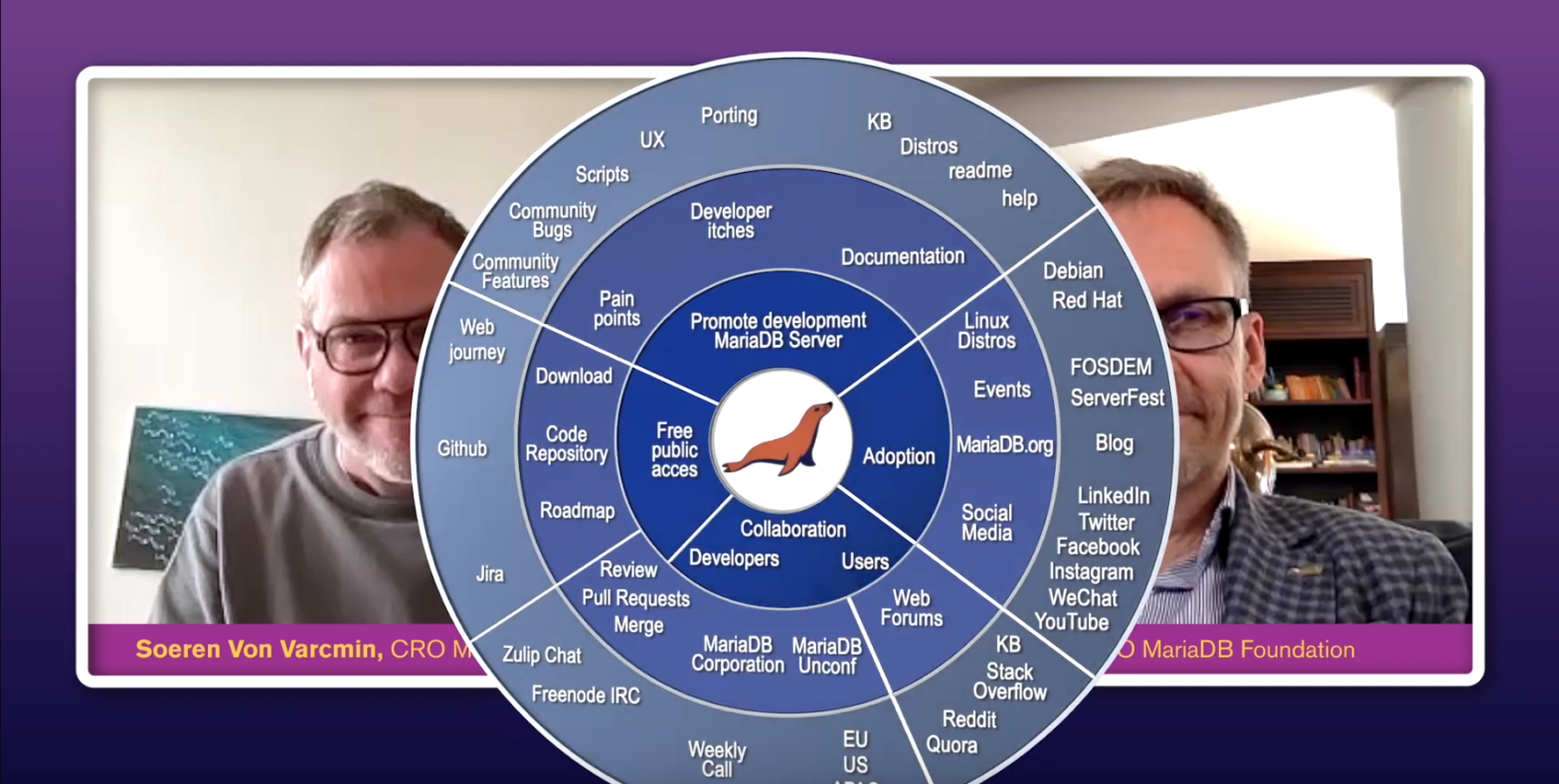Category Archives: Community
We use a couple of mailing lists for discussing various topics with our community. For historical reason, some lists were hosted at http://lists.askmonty.org and other at https://lists.launchpad.net.
Regrouping our mailing list under the MariaDB Foundation domain was a long overdue topic and I finally decided to tackle it. This simplifies mailing list management and brings full control over how we send our emails (see bellow: SPF, DKIM and DMARC).
In this post I will present the new mailing list system that we have deployed and how we proceeded to moving to that new system.
…
The MariaDB Foundation values our partnerships with our sponsors. Our partnership with IONOS allows us to get insight into how MariaDB Server is used and the direction it should take. As well as generally improving MariaDB Server in many different ways.
IONOS story
At CloudFest 2023, one of the first meetings we had was with Stefan Erkeling from IONOS. It was a very good meeting and it was great to see how much IONOS values our partnership. Stefan indicated in the meeting that there was a performance issue they were hitting and some advice was needed.
…
Continue reading “MariaDB & IONOS: Improving performance for hosting”
MariaDB Foundation’s CEO Kaj Arnö chatted to MariaDB Foundation CRO (as well as chairman of the CloudFest advisory board) Soeren von Varchmin about the the successful CloudFest 2023, which took place in Germany, from 21 to 23 March. View the videos Part 1 and Part 2.
CloudFest takes place at Europa Park, Europe’s largest amusement park, and this year saw over 8000 people with more than 90 countries. Unlike the similarly-sized FOSDEM, which focuses on open source developers, CloudFest attract cloud service providers, hosting companies, IT departments etc, as also has a particular focus on WordPress (MariaDB participated in the hackathon).
…
In this blog we will show how to access MySQL and MariaDB DBMS tables from MariaDB Server. For that we will use Connect Storage Engine (SE), which supports different table types options. In this case we will use the JDBC table type. To use the JDBC table type we need to specify it in the CREATE TABLE definition for Connect SE and we need the Java connector for the DBMS we are accessing. For demonstration purposes we will use containers, but this will work if the servers are running in VMs or bare-metal. Just make sure the machines can access each other via TCP/IP.
…
Continue reading “Connect SE JDBC table type: Accessing Tables From Another DBMS”
We are excited to announce that this year MariaDB has once again been accepted as a Google Summer of Code organization. With this blog post I want to showcase the projects we’re taking on and wish good luck to our mentees for the summer!
At MariaDB we strongly believe in growing Open Source and we encourage new developers to contribute. Google Summer of Code allows us to have dedicated contributors focus on a project for a few months, knowing the costs are covered. We at MariaDB can then just focus on the core aspects – writing code and growing our community.
…
Continue reading “MariaDB is part of Google Summer of Code 2023”
In a previous blog post, I gave an overview of the CloudFest Hackathon. At this event my team created a plugin for WordPress which added additional health checks for MariaDB. Since the Hackathon we have managed to get this plugin into the official WordPress plugin repository and are working on improving it.
About the plugin
The plugin is designed in a modular way with multiple parts that can be useful for WordPress administrators. The following is a breakdown of all the parts currently in the plugin.
Metrics
One of the core features is gathering metrics about the queries executed.
…
In a movie theater near you, expect to soon see an explanation of MariaDB Server and MariaDB Foundation in your own language! That is, providing you speak one of the good dozen of languages we have frequently encountered in the MariaDB Server ecosystem.
English is a least common denominator
Like a majority of the MariaDB Server users, most of the developers behind MariaDB Server are non-native English speakers. We use Bad English as our lingua franca. Our pronunciation may be bearable to OK, but as with most techies, our understanding of written and spoken English is OK to good.
…
In this blog we are going to learn how to migrate data from Oracle to MariaDB.
To begin, we’ll learn the basics about Oracle database to have an understanding about the steps that are done on the demo example. After, we will create a table in Oracle and migrate it to MariaDB.
To migrate data from Oracle there are 2 ways:
- Dump Oracle data to CSV and load data in MariaDB.
- Use the Connect Storage Engine to create or insert into a table from Oracle’s source definition.
For demonstration, we are going to use a docker container with an Oracle Express Edition (XE) image.
…






